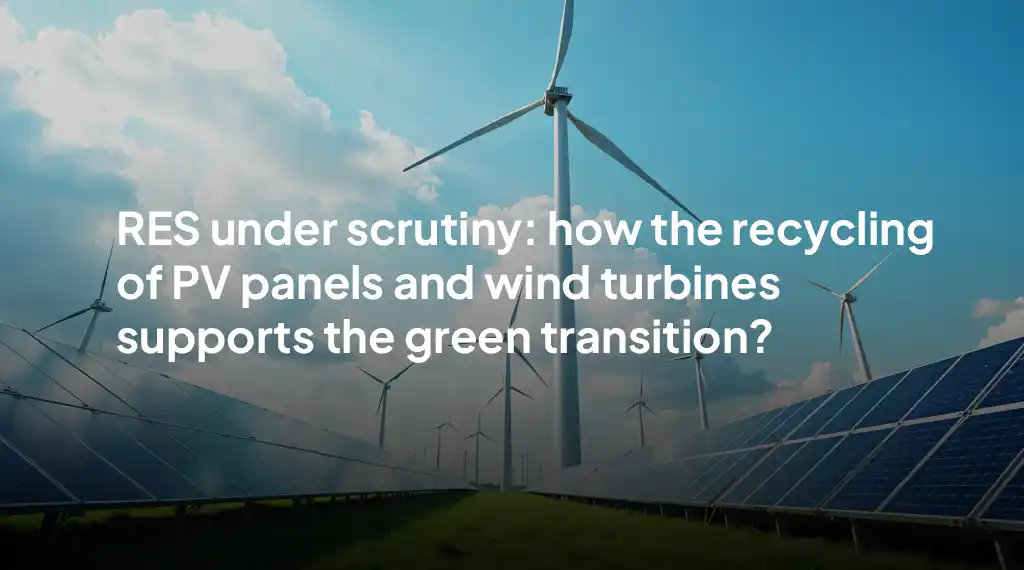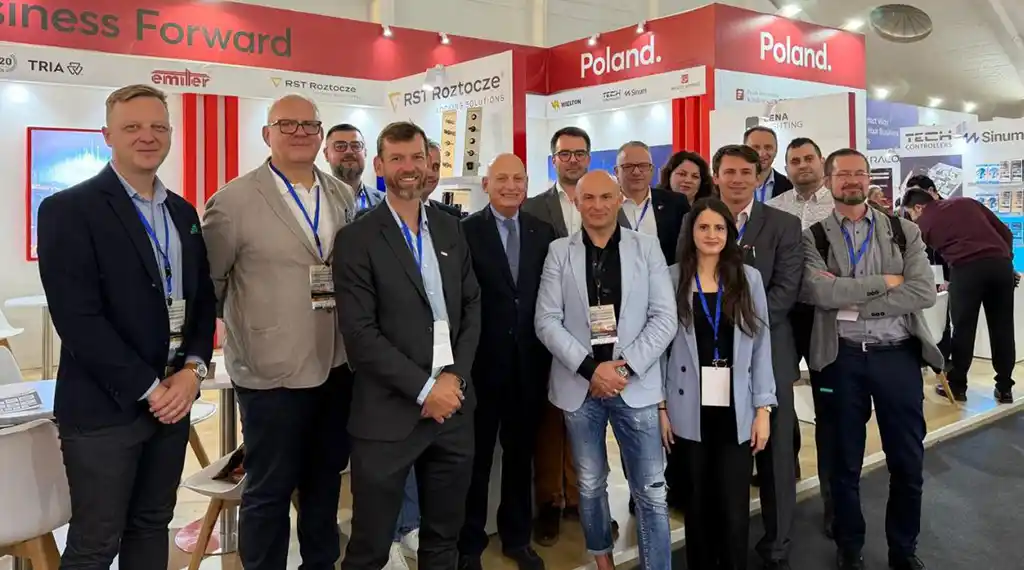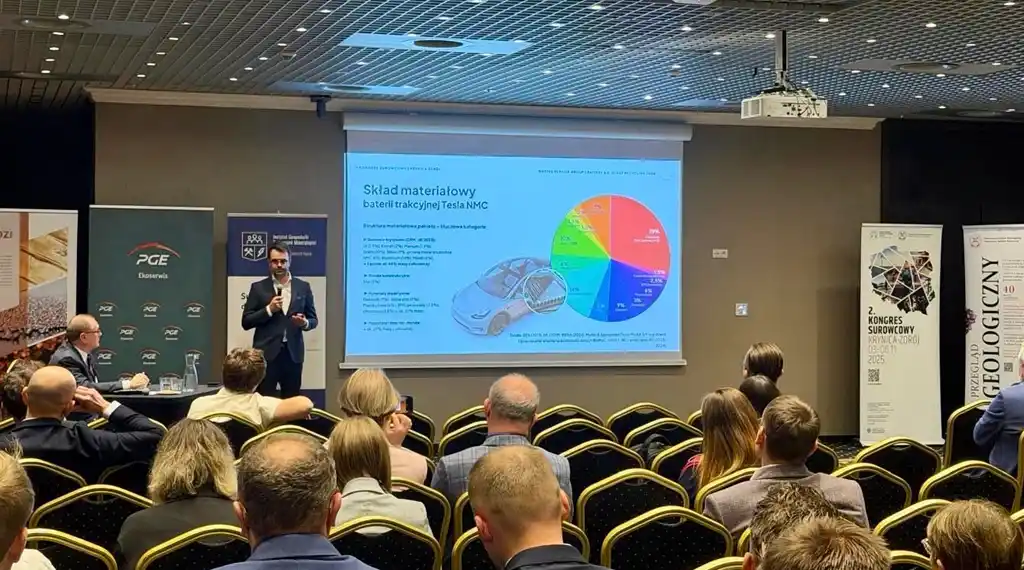
The development of renewable energy sources (RES) such as photovoltaics and wind power is the cornerstone of Europe's energy transition. The increasing number of installations in Poland and throughout the European Union translates into an increase in the share of green energy in the energy mix, but at the same time raises new challenges related to the end of the life cycle of these technologies. Photovoltaic panels, wind turbines or their components after a dozen or several decades of use become waste that must be managed safely and efficiently. Renewable energy is therefore becoming not only an environmental necessity, but also a strategic element of the circular economy.
The dynamic development of photovoltaics and wind energy in Poland and the entire European Union leads to an unprecedented increase in the number of installations of renewable energy sources. Although they contribute to reducing emissions and increasing energy security, they also generate new challenges related to waste management. After more than a dozen years of operation, PV panels or wind turbines become worn-out equipment requiring proper management. Renewable energy recycling is therefore becoming a key element of the energy transition strategy, allowing the recovery of valuable raw materials and reducing the negative impact on the environment.
The energy transition in Europe and Poland is gaining momentum. The number of new photovoltaic installations and wind farms is increasing year by year, which significantly increases the share of green energy in the energy mix. However, dynamic development also means an increasing amount of equipment that will require disposal in the future.
PV panels have a lifespan of about 25-30 years and wind turbines about 20-25 years. After this time, they become waste requiring specialized recycling. The disposal of PV panels and wind turbine blades is a huge challenge due to their size, material composition and logistics costs.
According to estimates by the International Energy Agency, by 2050 in Europe alone, renewable energy waste will be counted in millions of tons. The largest part will be spent photovoltaic modules and wind turbine blades, which requires the development of efficient recycling systems.
Photovoltaic panels contain many valuable raw materials, such as silicon, silver, copper, aluminum or glass, whose recovery is important both economically and environmentally. The recycling of PV panels includes advanced mechanical and thermal methods, allowing to separate individual components, minimizing waste and reducing the pressure on the extraction of natural resources. Thanks to this, the recycling of photovoltaic panels supports the idea of a circular economy and enables the efficient use of critical raw materials in RES.
PV panel is a technologically advanced product in which we can find, among others, crystalline silicon, silver, aluminum, copper, tempered glass and plastics. This makes the recycling of photovoltaic panels not only an environmental necessity, but also an opportunity to recover critical raw materials.
The recycling of RES in the field of photovoltaics is carried out by means of mechanical processes such as shredding and separation and thermal, which allow the separation of silicon layers from glass and metals. Work is also underway on more efficient chemical methods.
The recovery of precious metals and aluminum reduces the need to extract natural resources, which reduces emissions and production costs of new panels. The recycling of photovoltaic panels supports the circular economy and allows the reuse of critical raw materials in RES.
Wind turbine blades are made of durable composites, the recycling of which is a major technological challenge. Traditional disposal methods are often costly and limit the recovery of materials. New technologies and innovative projects in the EU enable the processing of composites, the recovery of raw materials and the reduction of waste from RES, while supporting the development of the circular economy and the sustainable energy transition.
Turbine blades are made of composites based on fiberglass and epoxy resins, which makes them difficult to recycle. Their large size means that the disposal of wind turbines requires specialized installations and high financial costs.
In Europe, innovative projects are being carried out that involve the use of pyrolysis methods, chemical recycling or the reuse of ground composites in construction. These solutions are aimed at developing the recycling of wind turbine blades on an industrial scale.
The increasing number of renewable energy installations requires the creation of a clear legal framework for recycling and disposal of equipment at the end of its life cycle. EU directives and national regulations define the obligations of producers and plant owners, as well as the roles of recycling companies in an efficient waste management system. Compliance with regulations ensures not only environmental safety, but also the efficient use of critical raw materials in RES.
The European Union has consistently introduced rules on waste management, including RES waste. The new regulations aim to increase the level of recovery of raw materials and reduce storage.
Manufacturers of PV panels and wind turbines and plant owners will be required to finance recycling and report on the amount of equipment introduced. The obligations of RES producers are part of the extended liability principle.
Recycling companies will play a key role in the management of renewable energy waste. They will be responsible for logistics, processing and recovery of raw materials, while supporting the development of green energy and recycling.
Wastes Service plays a key role in preparing Poland for the upcoming wave of RES waste. Through comprehensive photovoltaic and wind turbine recycling services, the company supports the circular economy, recovers valuable raw materials and enables manufacturers and plant owners to comply with legal obligations. The innovative approach of Wastes Service contributes to the sustainable energy transition and the development of green energy in the country.
Wastes Service actively develops competences in the field of renewable energy recycling. As part of the activities Capital Group Investing in new technologies and infrastructure.
Thanks cooperation with industry partners and experience described on the website about us Wastes Service is preparing for the growing volume of waste from photovoltaics and wind power, becoming an important link in the green transformation of Poland.
In conclusion, it should be stated that renewable energy recycling is becoming an indispensable element of the green transformation, allowing for the efficient recovery of raw materials from photovoltaic panels and wind turbines. Thanks to modern technologies, legal regulations and the support of companies such as Wastes Service, it is possible to reduce the amount of waste from RES, protect the environment and strengthen the circular economy. A responsible approach to recycling contributes not only to the development of green energy, but also to the sustainable use of critical raw materials.

16/12/25
Wastes Service Group's participation in the ELEC Expo in Casablanca includes discussions on critical raw materials, battery recycling and stable supply chains for energy and electromobility.


16/12/25
We are pleased to announce that Wastes Service Group participates in the economic mission to Morocco, organized by the Polish Investment and Trade Agency (PAIH).


15/11/25
Wastes Service Group participates in Batteries Event 2025 in Lyon. Filip Gabryelewicz will present our new Battery & e-Scrap Recycling Park and present a practical approach to Urban Mining.
